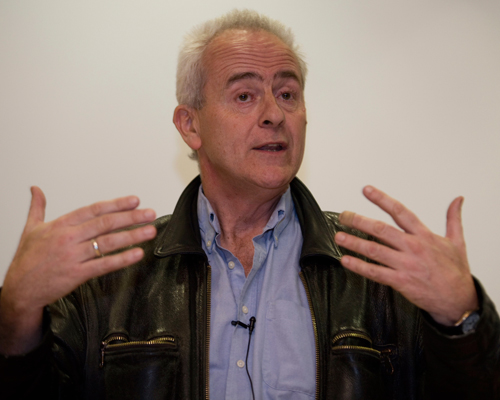Nick Davies came to a university with a School of Journalism full of vim, offering arguably one of the best Journalism courses in Britain is something that has been heralded in recent months. However, he wasn’t here to praise the industry. He was here to damn where it’s going. Conscious of his apocalyptic message about the media that he was about to impart upon many student journalists, Davies was, however, eager to express his joy of working as a journalist.
Listen to the whole talk by Nick Davies
The ‘Flat Earth News’ author spoke of what spurred him on to write such a damning exposé of the media: “This book is about the failure of journalism to do the single thing that is most important to journalists…to tell the truth. The trigger for it…was those notorious weapons of mass destruction. It frustrated me that after the invasion, as the sand settled, it became clear that those famous weapons of mass destruction didn’t exist. It frustrated me that the media reported [the misinformation] as though it were really a problem of governments and intelligence agencies, which it was. But, if you look at the shape of the misinformation, there’s a third player in there, which is ourselves [the media].”

He claimed that media misinformation almost unseated the most powerful man in the world at that time – Bill Clinton. Yet at the heart of the stories was falsehood: “It is quite frightening, when you dig down into the media coverage… and say ‘where are the facts upon which all this stuff is based?’. You don’t find facts. You find a mess of genuine falsehood and populist misconception.”
Davies brought the audience to the attention of some of his current work on sex-trafficking. He cited it as an example of media distortion directly influencing government policy – even if it is not based on factual evidence.
Davies said that the media would claim that thousands of women were being smuggled into Britain and forced to work as prostitutes, citing 25,000 as a popular estimate. He contested this: “I’m pretty sure that 99 percent of what we’re being told about that is garbage…It [isn’t] happening… there [aren’t] 25,000 sex slaves in this country…. Off the back of that, the government is now legislating.” The government are tightening laws for curb-crawlers. This will cause more damage than good, he argues, despite appearing as justifiable policy.
The award-winning journalist is a firm believer that the commercialisation of the media through corporate ownership is at the heart of the problem: “Those corporations inject into their newspapers the logic of commercialism, which in all sorts of interesting ways, usurps the logic of journalism. It means that we no longer do our job properly. If you’re a big company and you take over a newspaper…what you want to do is make a profit out of this…what you’ll do is look for ways to cut costs and ways to increase your income… what you find now is your average Fleet Street journalist is filling three times as much newspaper space as she or he was twenty years ago. If you flip that round and look at it from the journalist’s point of view, it means that story by story, on average, we only have a third of the time to what we used to… time is our most important working asset. If you restrict our time; you stop us being able to do our jobs properly.”

Davies and his research team took every home news story in the quality press and the Daily Mail for two randomly-selected one-week periods. In total, they collated 2000 news stories. They discovered that only 12% of those stories showed evidence of being thoroughly checked. Even more worryingly, only 12% came from journalists and their own research. 8% could not be accounted for, whilst a staggering 80% were from secondary news sources, i.e. wire copy and PR. Davies summarised: “That’s what happens when you take time away from journalists.”
One of the “rules of production” listed in his book is called “Ninja Turtle Syndrome”. When his children were young, Teenage Mutant Ninja Turtles were all the rage. He had decided not to let his children be absorbed by this craze and so didn’t buy them the toys or let them watch it on the television. When his children came home from school miserable as they weren’t able to engage in conversation with their peers because they were all talking about Ninja Turtles, Davies felt he had to let his children watch it and buy the merchandise for them. He draws a parallel with the media: “We don’t now choose stories that are important; we choose stories that will sell newspapers or lift ratings. That’s commercialism moving in and changing the way we think about news values.”

Davies spoke lastly about the future of journalism – and it’s not good news: “The corporations are in really serious trouble. Journalists on regional newspapers in this country are losing their jobs at the rate of 150 per month. This matters…[because] the remaining thin stream of reliable information about local communities is turning into a drought. You may be seeing the death of an industry. It isn’t just about journalists and their jobs. It’s about whether there is someone there to tell you the truth.”
